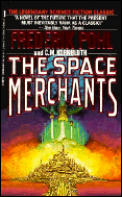
| Series: | Space Merchants #1 |
| Publisher: | St. Martin's |
| Copyright: | 1952, 1953 |
| Printing: | March 1987 |
| ISBN: | 0-312-90655-2 |
| Format: | Mass market |
| Pages: | 169 |
Mitchell Courtenay is an executive for the well-respected advertising firm Fowler Schocken Associates, an ambitious high-level corporate manager and marketing strategist who is adept at playing the politics of his company and kowtowing to Fowler Schocken. He is unexpectedly assigned the star contract of the whole agency: sell an interplanetary colonization effort to the nearly uninhabitable planet of Venus to prospective colonists. But an internal corporate fight shows him far more of his marketing-driven civilization than he expects.
The Space Merchants is a classic short satirical novel with an SF background. It's set in a relatively near 1950s future, one where we have huge growth in biotechnology and population growth and some stock flying-car-type things, but not much in the way of meaningful space travel other than moon colonies. What this world does have is the triumph of marketing. Advertising, brand loyalty, and consumer market share have become the most important drivers of society, with advertising agencies near the pinnacle of corporate power and some truly nasty and disturbing tricks (like intentional addiction) used to keep consumers consuming. It is, in that sense, startlingly prescient, despite having a dated 1950s feel to the extrapolation.
The story, unfortunately, is not as good as the novel idea and background. Mitch starts as an unlikeable semi-villain and a corporate butt-kisser, which is an initially unusal albeit off-putting protagonist choice, but he turns into the competent engineer with a wrench over the course of the novel. His wrench is words and office politics rather than science, but it has a similar effect on the novel. It's a bit ahead of its time in having female characters with real agency and something other than violence or engineering as its problem resolution strategy, but the plot and the characters will feel very dated to the modern reader. That's unfortunate, since it undermines a book that otherwise is still remarkably relevant.
Like most satire (and most fiction), The Space Merchants has to make obvious and excessive things that are more marginal and nuanced in reality, but with that caveat, it hits its mark. We don't have literally addictive cycles of junk food, but that's mostly because of the FDA (and this book was written well before the discovery of the tactics used by tobacco companies, which aspire to these depths). Commercial meat farming is not at the level here, but it comes disgustingly close. And Pohl and Kornbluth capture the stifling feeling of the modern variation of debt slavery remarkably well, despite getting the details wrong.
The extrapolations are also interesting for what they get wrong. Extrapolation is more about the past than the future; looking at the misses from otherwise good extrapoloation can show some of the changes that were completely unexpected. For example, the debt slavery that keeps the average worker (consumer) in line in this book is essentially a reversion to the company store model of isolated company towns in the 19th century. Pohl and Kornbluth didn't anticipate the near-complete destruction of loyalty between company and worker, so instead had their dystopia take that loyalty and turn it into something abusive. The idea that completely separate companies without any explicit collusion would combine to lock people into debt cycles that forced them to work (and consume inferior products) while still maintaining the apparent freedom to move from job to job and product to product was either too subtle for the story or too unanticipated given the nature of corporate connections in the 1950s. There are also, more mundanely, a plethora of horribly dated-sounding brand names, which shows how drastically fad and culture around product naming and branding changes in fifty years.
The Space Merchants is a bitterly satirical world undermined by a lightweight and dated plot, and suffering from an apparent solution that we now know is both probably physically impossible (at least as near to the present as this book is set) and which wouldn't solve the underlying problem anyway. It's very obvious that it was written in the 1950s; the Cold-War-style skullduggery and dated characterization are somewhat off-putting and bring the book down a few notches when read today, and the intercorporate fighting is rather over the top. But the core satirical point is still bitingly relevant, anticipating some of the points of the 1960s counter-culture by a decade, and holds up well against a modern reading. The best parts of the book are the ones where Pohl and Kornbluth show, not a conspiracy, but a dystopia generated via the aggressive exercise of unregulated self-interest. It's a good counterweight to the more common libertarian trend of SF.
Mildly recommended, but as a classic rather than a straight read, and you'll need to have some tolerance for the plot.
Reviewed: 2011-10-21